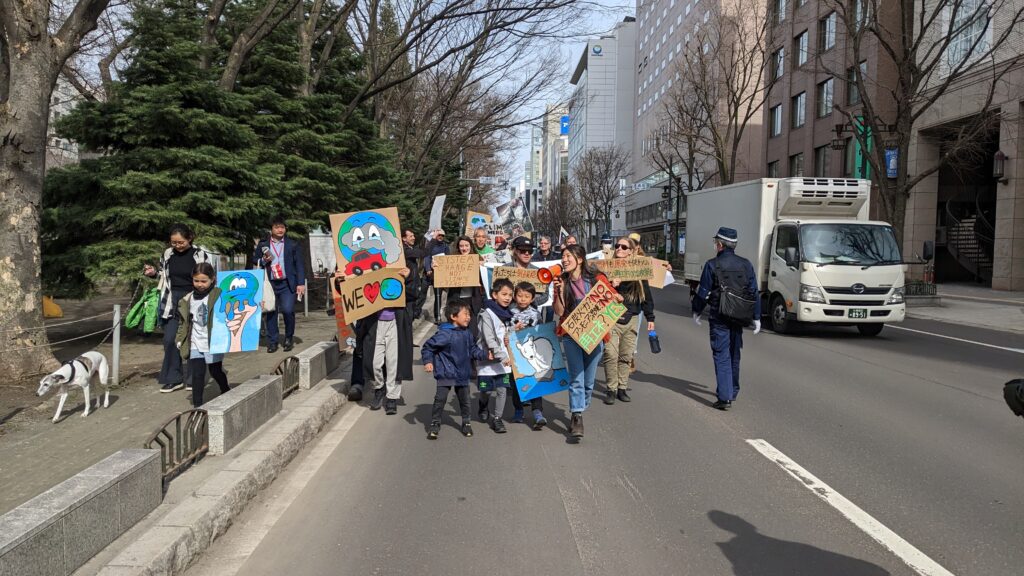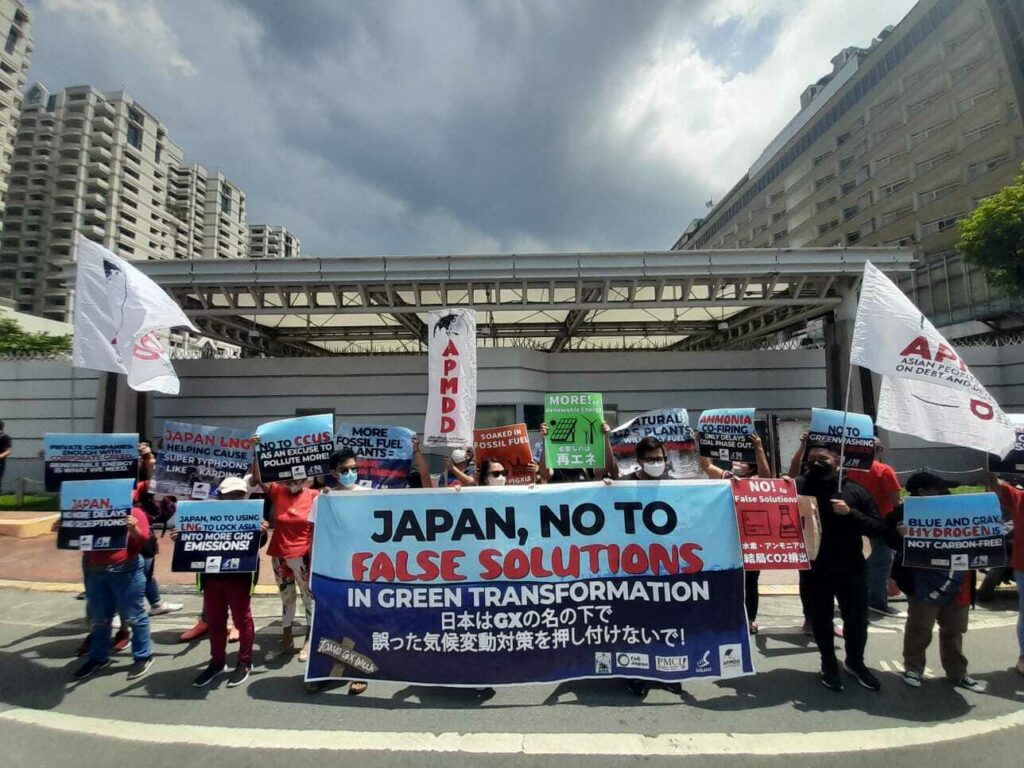
G7 host Japan under fire for being an obstacle to climate action and leadership
Japan is under fire as it heads into the G7 Summit. Activists are organizing actions in Japan, across Asia, and around the world, to pressure Japan to stop utilizing its G7 presidency to drive the expansion of gas and other fossil fuel-based technologies. As the G7 leaders meet in Hiroshima on May 19-21, Japan must stop derailing the energy transition for the G7, in Asia, and globally; and shift its support from fossil fuels to renewable energy.
At the G7 Climate, Energy and Environment Ministerial held in Sapporo on April 15-16, the Japanese government set out to promote its “Green Transformation (GX)” strategy which includes fossil fuels and fossil fuel-based technologies. However, opposition from the UK, France, and Canada kept the G7 from backing Japan’s unproven technologies – namely ammonia and hydrogen co-firing with coal and gas.
The GX is a Japanese policy that maps out the country’s path to achieving carbon neutrality by 2050 while promoting economic growth. However, the GX policy is a greenwashing exercise to benefit Japanese corporate interests that rely heavily on fossil fuel-based technologies, including liquefied natural gas (LNG); co-firing of ammonia at coal power plants; fossil hydrogen; and carbon capture, utilization and storage (CCUS).
Japan’s blatant promotion of GX at the G7 ministerial garnered opposition from G6 countries and criticism from the media. G6 officials referred to Japan as “an obstacle” in the G7’s energy transition agenda. Articles highlighted Japan’s lack of climate ambition and leadership, the weak feasibility of ammonia co-firing, and Japan’s relentless interest in gas and coal.
Failure to end finance for fossil fuels, including gas
At last year’s G7 Summit, member governments committed to stop public financing for overseas fossil fuel projects by the end of 2022. At the Sapporo ministerial, the G7 congratulated themselves for “ending” public support for the international unabated fossil fuel energy sector. However, recent analysis shows that while the UK, Canada, and France have halted their international fossil fuel finance, Japan, Italy, and Germany have not; they have even approved new fossil fuel investments in 2023.
Pushed by Japan, the world’s largest provider of international public finance for gas between 2020-2022, the ministerial communique also broke the above commitment by stating investments in gas “can be appropriate” to address potential market shortfalls.
This loophole contradicts the International Energy Agency’s (IEA) warning on new gas investments. The IEA provided analyses for the G7, reconfirming its 2022 World Energy Outlook scenarios that gas demand is expected to decline in advanced economies. Furthermore, the IEA cautions that even existing LNG projects under construction should remain unutilized, and existing LNG capacity must be decommissioned early, to hold global warming to 1.5ºC.
Japan’s spin on the communique
While the other G7 countries rejected endorsing Japan’s push for ammonia and hydrogen co-firing, both the Japanese government and media are glossing over the language in the G7 communique, giving the impression that the text affirms the role these technologies play in the path to net zero.
However, academics, politicians, analysts, and environmental groups are questioning the feasibility, affordability, and efficiency of co-firing as a decarbonization measure. Burning coal and ammonia in equal amounts would still emit about as much CO2 as a gas-fired power plant. Most ammonia and hydrogen are also produced from fossil fuels, which generate substantial emissions.
The Japanese government also stresses agreement on “the common goal of net zero through diverse paths according to each country’s circumstances” as one of the main outcomes of the ministerial. In the Japanese government’s understanding of this agreement, gas investments and fossil fuel-based technologies are acceptable options, as paths to decarbonization depend on each country’s “circumstance.”

Push to expand fossil fuels in the Global South
As Japan faces isolation among G7 countries with its continued reliance on and promotion of fossil fuels and fossil fuel-based technologies, the country is looking to the Global South for support and partnerships. Prime Minister Kishida invited the African Union to the G7 Summit. He also traveled across the continent a few weeks before the Summit, aiming to win allies for Japan “as a partner growing together with Africa.”
While visiting Mozambique, Kishida and President Nyusi agreed to cooperate on Mozambique’s LNG project. However, civil society leaders issued a clear statement that Africans want renewables not fossil fuel funding from the G7. Fossil fuels have not supported development in Africa. For decades, the resources and profits from fossil fuel extraction in Africa have been exported to the wealthiest countries, leaving behind communities with pollution, inequality, and poor energy access.
In Asia, Japan is using its diplomatic might to promote fossil fuel-based technologies within the Association of Southeast Asian Nations (ASEAN). Japan is utliizing the GX to play a more dominant role in driving Asia’s energy transition with its energy businesses searching for new export markets. Despite Japan’s efforts to promote these technologies and expand the use of fossil fuels, civil society groups across Asia, from Bangladesh to the Philippines, are standing up and rejecting Japan’s dirty energy strategy. A new Don’t Gas Asia campaign launched with actions in 13 cities across Asia urging Japan and other financiers to stop financing fossil fuels and support renewable energy.

To tackle the climate and energy crises while boosting economic growth, as its GX policy claims, it should recognize that renewable energy solutions are reliable, available, cleaner, and cheaper. If Japan is sincere in its partnerships with the Global South, it must listen to the voices of the affected and most vulnerable communities. As this year’s G7 president, Japan must put people and planet above its love for dirty energy and corporate profits.

Strong opposition to gas in the Global South.
Don’t Gas Africa is a campaign led by African civil society to ensure Africa is not locked into fossil gas production. Check out the recent op-ed by African civil society leaders.
Don’t Gas Asia is a campaign to scale up and intensify the fight against fossil gas in Asia.

